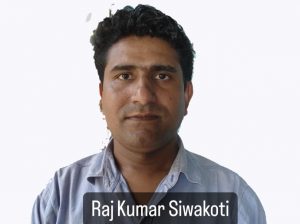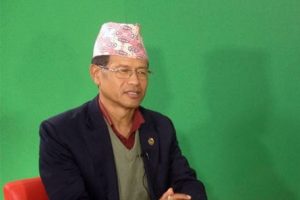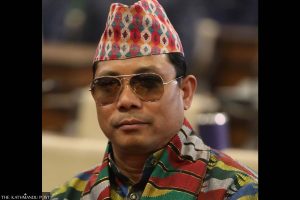Ø “If the case is tried according to the prevailing law, and if the the case is withdrawan on the basis of political consensus and if the need for the elements of justice and law is not shown, then the criminal justice system may become a victim of extreme politicization.”
-From inside the article.
_____________________________________________________
Advocate Raj Kumar Siwakoti
President, Human Rights and Democratic Forum (FOHRID)
and
Advocate Punya Prasad Khatiwada (PhD)
President, Non Aligned lawyers’ Organization (NAL)
Nepal
Begin text.

The present Government of Nepal and the Federal Parliament are toward the full spectrum with political protection of Impunity by forwarding a bill to enact law for withdrawal of serious criminal cases. Minister of Law, Justice and Parliamentary Affairs Dhanraj Gurung has registered a Bill on Act to amend certain Nepal Acts, 2080 (2023) in the Parliament. Section 64 of this “Amendment Act” provides for the state to withdraw criminal cases of serious crimes,
 as;-“64. Amendment to the National Criminal Procedure Code, 2074 (2017 AD): Section 116 of the National Criminal Procedure Code, 2074, is followed by the following section 116a. Added;-“116a. The case can be withdrawn to bring it into the mainstream of peaceful politics: Regardless of what is written in Section 116, if any political party or group is conducting violent activities while disagreeing with the political system of the country, and even if any case filed by the Government as a plaintiff is pending in the court of any level, there will be no hindrance to withdraw it, if consented for such withdrawal on the ground that such political party or group is committed to the mainstream of peaceful politics and conduct peaceful political activities under the Constitution and prevailing laws of Nepal.”
as;-“64. Amendment to the National Criminal Procedure Code, 2074 (2017 AD): Section 116 of the National Criminal Procedure Code, 2074, is followed by the following section 116a. Added;-“116a. The case can be withdrawn to bring it into the mainstream of peaceful politics: Regardless of what is written in Section 116, if any political party or group is conducting violent activities while disagreeing with the political system of the country, and even if any case filed by the Government as a plaintiff is pending in the court of any level, there will be no hindrance to withdraw it, if consented for such withdrawal on the ground that such political party or group is committed to the mainstream of peaceful politics and conduct peaceful political activities under the Constitution and prevailing laws of Nepal.”
The proposed provision protects criminal activities in the name of politics. The provision that violent activities will be excused if they come into the mainstream of politics and the case will be withdrawn, is against the criminal justice system and rule of law of Nepal as a civilized country. It also legitimately assassinates human values and human rights and promotes state of impunity. The withdrawal of criminal cases including serious crimes like killing, rape, theft, homicide, robbery, drug smuggling, women and human trafficking, hostage taking, woods smuggling etc., is emblematic in this regard.
But the said provision is contrary to the preamble and Article 16(2) of the Constitution of Nepal, principle of independence of judiciary and fair trials, protection of and compensation to the victim from the offender. It is a common principle of the criminal justice system that such a regressive provision is not allowed any way.
The Bill provides power to withdrawal of any of the “State Cases” filed by the government, from irrespective of any level of courts. Ironically, the Bill provides neither procedural nor substantive safeguards against arbitrary withdrawal of cases. This could be viewed as totally invalid considering Nepal’s international legal obligations under several treaties including the International Covenant on Civil and Political Rights (ICCPR), 1966. This has aggravated impunity by affecting the justice system, rule of law and accountability of state.
Impunity and case withdrawal prevailed in Nepal since the past. The trend of withdrawal of criminal cases is occurring unabated, and there are legal and structural hurdles in effective prosecution of perpetrators involved in serious crimes. Nepal government has failed to bring into justice system and prosecute those who are alleged of involvement in the serious human rights violation including that of Feb 1996 to Nov 2006 and perpetrators of the Peoples’ movement I and II instead of recommendations by the separate “Mallick” and “Rayamajhi” Commissions. There is a risk even if the perpetrator identified by the TRC and Disappearance Commission might get withdrawal of cases and amnesty.
The conflict took a terrible toll on the people of Nepal, with both parties to the conflict being responsible for serious crimes under international law during the armed conflict (13 Feb 1996 to 21 Nov 2006). The most affected were the poor and the marginalized, let alone the plight of the indigenous people (e.g., over 80% of those disappeared from Bardiya belong to Tharu community). The State was responsible for 8377 killings and Unified Communist Party of Nepal-Maoist (UCPN-M) was responsible for 4970 killings. The practice of enforced disappearance in Nepal during that period was amongst the worst in the world. Both sides, the security forces and members of UCPN-M, were responsible for numerous acts of enforced disappearance. It is generally estimated that over 3,000 people were victims of enforced disappearance. The United Nations Office of the High Commissioner for Human Rights, on 8 Oct 2012 states, “up to 9,000 serious violations of international human rights law or international humanitarian law may have been committed during the decade long conflict … However, at the time of writing, no one in Nepal has been prosecuted in a civilian court for a serious conflict related crime.”. “Accountability, therefore, remains a matter of fundamental importance to Nepal as it deals with its legacy of conflict.” The report expresses concern at moves by successive governments to withdraw cases of “a political nature” and at recent Government proposals that the planned future Truth and Reconciliation Commission [TRC] be given broad amnesty powers.
Besides, Nepal has unable to initiate vetting process in the political level, judiciary, security agencies and bureaucracy of Nepal. The alleged senior officials of the government and security agencies are still holding their offices and the UCPN-Maoist, one of the parties in conflict, is now the leading ruling party in the government.
The National Criminal Procedure Code, 2017, Section 116(1) provides that no case once filed in the court on any offense shall be capable of being withdrawn. But the government has contributed to increase de facto and de jure impunity by withdrawing criminal cases in the past as well as toward the political protection of Impunity by enacting law for withdrawal of serious criminal cases through the new Bill.
The government in the past has withdrawn several cases of criminals involved in the crimes such as killing, theft, homicide, robbery, drug smuggling, trafficking, woods smuggling etc. The interim government of 1990 withdrew 243 cases in the name of political cases. The cases were mainly related to brutal violence and killing by groups, robbery, drugs smuggling and smuggling of woods. The Nepali Congress led government withdrew 99 cases of criminal nature from 1991 to 1994. The nine months long government led by CPN-UML withdrew 210 cases. The coalition government of Nepali Congress, Rastriya Prajatantra Party, Nepal Sadbhawana Party withdrew 10 criminal cases. The Ministry of Law and Justice sent the cabinet decision of 27 Feb 2012 on case withdrawal to the Office of the Attorney General for implementation. Through this decision of consensus among UCPN (M), Nepali Congress, CPN (UML), Madheshi People´s Rights Forum (MPRF) and other ruling Madhesi parties, 425 criminal charges were withdrawn. There has been an increasing trend of case withdrawals by the Government, citing clause 5.2.7 of the Comprehensive Peace Agreement of 2006 and on the basis of other subsequent political agreements. This was first used in Oct 2008 when the then Cabinet ordered withdrawal of 349 cases of “political nature” that had been filed against political party cadres. Maoist led governments have withdrawn 695 cases relating to serious crime aggravated by promotion of those alleged of serious human rights violation, failure to prosecute crimes. This has made mockery to the commitments of Nepal government for justice, peace and human rights.
Most of these cases have since been successfully withdrawn. Government bodies have repeatedly decided to withdraw cases for this reason: In Oct 2009 under the CPN-UML led Government, the Cabinet withdrew 24 cases; in Nov 2009 the CPN–UML Government withdrew a further 282 cases; and in March 2012 the UCPN-M led Government requested the withdrawal of 34 cases against at least 300 individuals. On this occasion, the withdrawals were part of an additional September 2011 political agreement between the UCPN-M and the United Democratic Madhesi Front. In all these instances of case withdrawals, no clear and accurate definition of a “political case” was ever provided, and it is apparent that many of the accused persons have political links with members of the Government. A large number of cases recommended for withdrawal are of a serious criminal nature, and many fall outside the period of the conflict. The withdrawal of cases where serious international crimes have been alleged is contrary to both IHL and IHRL (OHCHR: 2012).

While analyzing the present scenario of Nepal, the trend of withdrawal of criminal cases has made the prosecution initiatives fragile. Recently, despite the Supreme Court (SC)decided as guilty, the government gave amnesty to Resham Chaudhary responsible to Tikapur massacre where seven security personnel including a senior police officer and a toddler were killed on Aug 24, 2015, in the run-up to the promulgation of the Constitution of Nepal.
Politicization of crimes challenges administration of justice and implementation of law. In this way, the criminalization of politics and politicization of crime both have promoted impunity and decreased state accountability. Withdrawal of criminal cases by the government is deeply affecting the transitional justice process.
The SC has established the jurisprudence that the government of Nepal cannot withdraw cases of serious crimes and make such a law. The SC on 17 Apr 2012, has clearly stated that while law remains in force, the implementation of the law cannot be done in one way if political persons are involved and differently in others. It does not match the standards of equality, justice and conscience. In fact, Section 29 of the Government Cases Act, 2049 (1992) should not be allowed to be used as a weapon to absolve from the responsibility of crimes on the basis of political cases, political consent or involvement of political activists. Thus, Nepal cannot under any circumstances make a legal provision of withdrawal of cases against the right to effective remedy-as a tool of deprivation of justice.
In view of the principle (precedent) propounded by the Supreme Court on the date 17 Apr 2012, in the issue of certitiori, injunction, mandumas–
Ø If the case is tried according to the prevailing law, and if the the case is withdrawan on the basis of political consensus and if the need for the elements of justice and law is not shown, then the criminal justice system may become a victim of extreme politicization. Withdrawing or permitting case withdrawal on such basiscannot be consistent with law, justice and prudence to claim that a legal prosecution has been defeated by giving place to a political agreement that is not envisaged by the Constitution and law. (Chapter No. 20)
Ø While law remains in force, the implementation of the law cannot be done in one way if political persons are involved and differently in others. It does not match the standards of equality, justice and conscience. In fact, Section 29 of the Government Cases Act, 2049 (1992) should not be allowed to be used as a weapon to absolve from the responsibility of crimes on the basis of political cases, political consent or involvement of political activists. (Chapter No. 22)
Through the case vide Decision No. 8013, dated 13 Jan 2009, the Supreme Court, has propounded precedent regarding withdrawal of cases as: –
Ø The intention of the law and the constitution is not to withdraw any case and the intention of the government is not to encourage impunity. If the government continues to withdraw without looking at the seriousness of the content even in the cases of violation of humanitarian laws of a serious nature, and if the courts do not look at the justification, the responsibility and accountability of the government to protect the lives and property of the people will be lacking, and the existence of the legal state will be questioned.
Through the case of certiorari, mandumas, vide Decision no. 8828, the joint bench of the Supreme Court set a principle (precedent) in relation to withdrawal of case as;
Ø With the change of government, the practice of withdrawing the cases filed in the court regarding criminal offenses, without any definite basis and criteriaonly because they are associated with a particular political party, will lead to a setback in the State’s objective of maintaining law and order, ending impunity and establishing the rule of law by protecting the lives and personal freedoms of citizens.
UN Committee against Torture voiced specific concernsin Nov 2010, regarding de facto impunity that may result from proposed case withdrawals, Nepal cannot make a law to withdraw criminal cases of a serious nature by challenging the specific concerns expressed in the periodic report process.
Therefore, the Section 64 of the Bill should be withdrawn as soon as possible.If the legislature proceeds with the Bill on case withdrawal and enacts laws for that purpose, it will bring conflict between and among the judicial system, the judiciary, and the legislature eliminates the principle of separation of powers and there will be the situation of might is right and impunity.
Moreover, the Enforced Disappearances Inquiry, Truth and Reconciliation Commission Act, 2014, and amendment on criminal codes should be amended to bring the national legal framework in line with international standards and best practices as well as the previous orders of the SC. Further, it is needed to insert a clear prohibition on withdrawal of cases (de facto as well as de jure) and no case withdrawal for serious crimes under law, and fully obligate the state to investigate and prosecute gross violations. The government must ensure punishment for the culprit and justice to the victims.
However, the campaign against impunity in Nepal cannot yield expected results till we apply vetting and prosecute those who are found guilty. Pressure should be exerted to the government and political parties to apply vetting process before any appointment, transfer or promotion.
Recently, the Communist Party of Nepal (Unified Marxist–Leninist) (CPN-UML ) Rastriya Swatantra Party (RSP) and Rastriya Prajatantra Party (RPP), which are in opposition to the government’s withdrawal of Resham Chaudhary’s case and prison amnesty, were unable to make a strong counterargument. Presently, the accused of fake Bhutanese refugee cases may get untoward benefits from this withdrawal law bringing it into the case withdrawals. Therefore, Nepali civil society is taking deep suspicion that the CPN-UML, RSP and RPP, can fully support the currently proposed amendment to withdraw criminal case. In this phenomenon, we request to the international community to issue diplomatic note to the Office of the Prime Minister and the Council of Ministers, Ministry of Law, Justice and Parliamentary Affairs,Ministry of Foreign Affairs and the parliamentary as well as non parliamentary political parties, to express their solidarity in our campaign against impunity and immediately stop the proposed amendment bill on withdrawal the cases of serious crime.
Last but not least, presently, the accused of fake Bhutani refugees’ cases may get untoward benefits from this criminal case withdrawal move. Therefore, Nepali civil society is taking deep suspicion that the CPN-UML, RSP and RPP, can fully support the currently proposed amendment to withdraw criminal case. In this situation, it is an urgent need of all common people, intellectual, parliamentarians as well as non parliamentarians, to express their solidarity in the campaign against impunity and immediately stop the amendment Bill for withdrawing the cases of serious crimes.
End text.
This post was originally published on this site be sure to check out more of their content.








